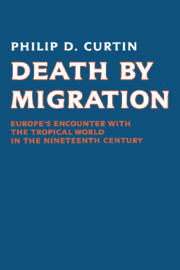Crossref Citations
This Book has been
cited by the following publications. This list is generated based on data provided by Crossref.
Arnold, David
1991.
The Indian Ocean as a disease zone, 1500–1950.†.
South Asia: Journal of South Asian Studies,
Vol. 14,
Issue. 2,
p.
1.
Harrison, Mark
1992.
Tropical medicine in nineteenth-century India.
The British Journal for the History of Science,
Vol. 25,
Issue. 3,
p.
299.
Kearns, Gerry
1992.
Historical geography.
Progress in Human Geography,
Vol. 16,
Issue. 3,
p.
406.
Butzer, Karl W.
1992.
The Americas before and after 1492: An Introduction to Current Geographical Research.
Annals of the Association of American Geographers,
Vol. 82,
Issue. 3,
p.
345.
Mc Daniel, Antonio
1992.
Extreme mortality in nineteenth-century Africa: the case of Liberian immigrants.
Demography,
Vol. 29,
Issue. 4,
p.
581.
Fetter, Bruce
1993.
Pease Porridge in a Pot: The Social Basis of Health and Healing in Africa.
History in Africa,
Vol. 20,
Issue. ,
p.
43.
Emmer, P. C.
1993.
Intercontinental migration as a world historical process.
European Review,
Vol. 1,
Issue. 1,
p.
66.
Kiple, Kenneth K.
1993.
The Cambridge World History of Human Disease.
p.
497.
1995.
Race and the Education of Desire.
p.
19.
1995.
Race and the Education of Desire.
p.
95.
1995.
Race and the Education of Desire.
p.
196.
1995.
Race and the Education of Desire.
p.
211.
1995.
Race and the Education of Desire.
p.
165.
1995.
Race and the Education of Desire.
p.
1.
1995.
Race and the Education of Desire.
p.
137.
1995.
Race and the Education of Desire.
p.
55.
Bell, Morag
1995.
Edinburgh and empire. Geographical science and citizenship for a ‘new’ age, ca.1900.
Scottish Geographical Magazine,
Vol. 111,
Issue. 3,
p.
139.
Hendrickson, Hildi
1996.
Clothing and Difference.
p.
213.
Weiss, Brad
1996.
Clothing and Difference.
p.
133.
Hendrickson, Hildi
1996.
Clothing and Difference.
p.
1.





